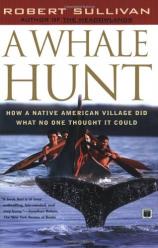Reading Group Guide
Discussion Questions
A Whale Hunt: How a Native-American Village Did What No One Thought They Could

1. Robert Sullivan begins A Whale Hunt with a series of primary documents -- newspaper columns, letters to the editor, tribal songs, etc. -- detailing the story's central conflict. Why do you think Sullivan chose to open the book this way? Do you the think the chosen excerpts are biased toward one side or the other? If so, do you think this influence was intended?
2. Why do you think Sullivan refers to Moby Dick and the life of Herman Melville throughout the book in footnotes? Lewis Mumford is quoted as saying about Moby Dick: "Melville sets out to teach us nothing." Is this true of Sullivan? If not, what is he trying to teach?
3. Neah Bay's unique history is evident, yet there are signs that it could be any remote town in modern-day America. There are moments in the book when the town's old and new cultures are shown co-existing, as when a crew member passes "in an old sedan out of which music was blaring." How did these contrasts affect the book's tone? What was your strongest impression of Neah Bay's culture?
4. What has made the whale such a strong symbol of the animal rights movement? How would the story have been different if it revolved around the hunting of another animal? Would it have been as emotionally compelling?
5. To what degree do you feel compassion toward certain animals? Are your feelings dependent on the kind of intelligence exhibited by the animal or the animal's ability to feel pain? How strong are your animal-rights convictions? Were they altered at all by reading this book? Why or why not?
6. How does Sullivan use humor to navigate the issues raised by the hunt? And, how does humor matter to the people involved in the hunt?
7. Paul Watson called the Coast Guard's focus on protestors' activities during the whale hunt "ludicrous". Do you agree? Throughout the story, did you feel the protestors were treated fairly? Should they have been given more or less leniency for their actions?
8. At one point, Wayne Johnson says: "This thing has become so much more than we ever imagined. Now, it's like we have to do it...with all the media and all the people watching us, we have to do it." What effect did the media and the protestors have on the hunt? Would the Makah effort have stalled without its fight against this organized resistance? Do you think most traditions are made stronger or weaker by outside resistance?
9. Recall the intimidating strength of Theron Parker, the reluctant leadership of Wayne Johnson, the steadfast opposition of Paul Watson. Which character's emotional reactions most closely mirrored your own? Which character would you liked to have learned more about?
10. Were there times in the book when it seemed the hunt would never be completed? When did it seem least likely to occur? Did the events leading up to the hunt strongly foreshadow its success or failure? How?
11. Early in the book, and again toward its close, the tribe's members talk of the hunt's spiritual meaning. Some crew members downplay the spiritual aspects of the hunt, while others pray and take part in other ceremonial rituals once the hunt is finished. Does spiritual intent affect your judgment of the tradition and, if so, how? Are there traditions in your life that are only understandable within their spiritual context? If so, what are they?
12. Sullivan writes: "In the end, it seemed ridiculous to try to experience a whaler's religious experience; it seemed absurd to attempt to simulate someone else's spiritual tradition." Do you agree?
13. Sullivan refers to the tribe's expedition as a "modern yet ancient ceremonial whale hunt". In what ways is it modern? In what ways ancient? As we judge traditions across cultural boundaries, what role should history play? To what degree do you partake in traditions because of their historic importance?
14. How does America's historic treatment of Native Americans affect your feelings about the tribe's desires? How does Sullivan handle this component of the story?
15. Discuss the aftermath of the whale hunt, and how you think it will affect the future. Are the Makah likely to continue their tradition? Will protest die down or increase? What do you think will happen to the people featured in the book?
A Whale Hunt: How a Native-American Village Did What No One Thought They Could
- Publication Date: May 7, 2002
- Paperback: 288 pages
- Publisher: Scribner
- ISBN-10: 0684864347
- ISBN-13: 9780684864341






